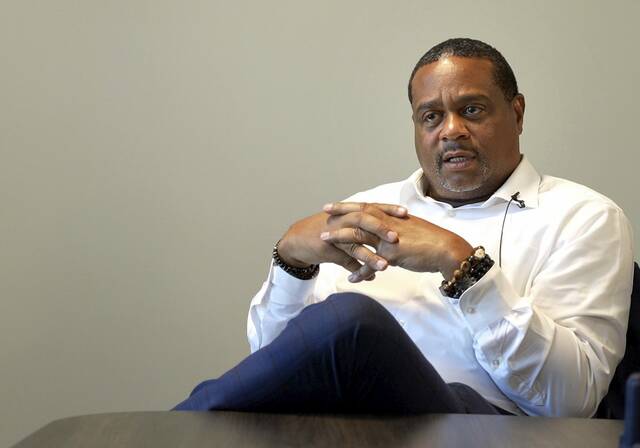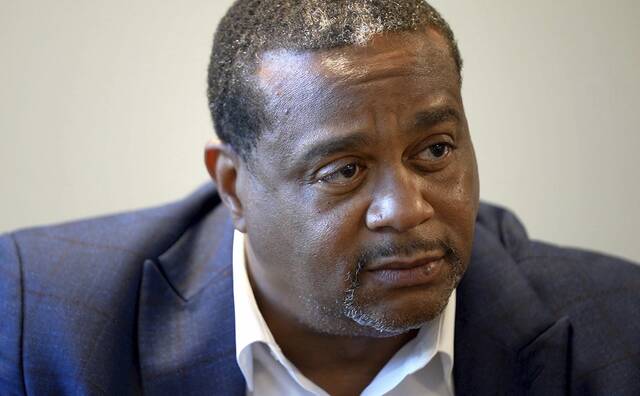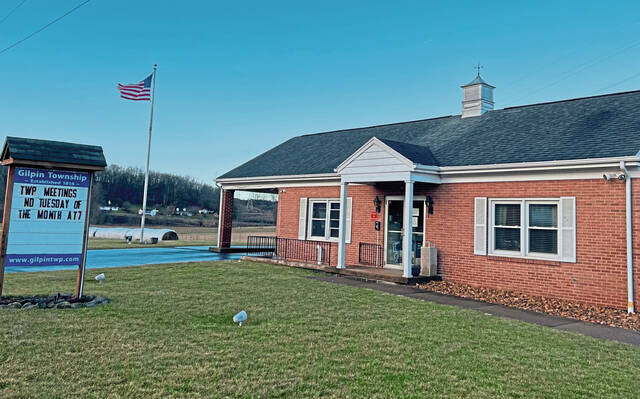Pittsburgh Mayor Ed Gainey said his main focus as mayor is restoring city services.
Gainey said that’s reflected in his 2024 budget proposal, which prioritizes funding to take care of core needs such as repairing bridges, updating what the mayor called “totally outdated” recreation centers and ensuring the Department of Public Works has the resources it needs to plow roads in the winter.
In a wide-ranging discussion this week with Tribune-Review editors and reporters, Gainey said his administration is looking to reduce crime rates and restore city functions that have been lacking in prior years.
“Coming in, it was not our budget and we were not fully staffed,” Gainey said, explaining that the city was ill-prepared to deal with snowstorms, below its budgeted level of police officers and struggling with major infrastructure issues — punctuated by the collapse of the Fern Hollow Bridge — when he took office nearly two years ago.
The mayor’s budget proposal for next year includes money for 849 police officers, down from the 900 officers the city budgeted for this year. But that number still reflects an increase in officers that could be patrolling the city, as Pittsburgh currently has 775 officers, according to public safety spokeswoman Cara Cruz.
“You’re not getting 100 (new) officers in a year,” Gainey said. “For us to budget for that wouldn’t make sense when we could utilize the money somewhere else.”
Gainey said he believes it’s possible for the city to reach the 849 proposed in his budget, but said 900 was out of reach for the upcoming year. The city has launched two new police classes since Gainey took office in an effort to bolster the bureau’s numbers.
“It’s still going to be challenging, but we’ve got the money budgeted to get there and we’re going to put every effort we can to get there,” he said of the efforts to bolster the police force’s numbers to the 849 officers included in the 2024 preliminary budget.
Gainey’s budget also includes a dozen new civilian community service aides for the bureau.
Though the city hasn’t had as many police as it’s budgeted for, Gainey and police Chief Larry Scirotto have said Pittsburgh has enough officers to keep the city safe on a daily basis.
“Even though we are under-policed, we are driving down violent homicide,” Gainey said.
Cruz said there’s been a nearly 21% reduction in killings across the city this year. There have been 42 homicides so far this year, down from 53 by this time last year, she said.
Gainey also touted a roughly $4.5 million increase in the operating budget for the Department of Public Works, a department that also got a boost in the mayor’s first budget last year.
The mayor said he’s working to ensure the department has the staffing and equipment necessary to clear streets quickly when it snows. The department’s operations bureau last year received funding for 55 workers more than it had the year prior. This year, it’s slated to lose one worker, bringing the total to 316.
Gainey’s preliminary capital budget for 2024 includes more than $86.4 million in engineering and construction projects, which constitutes about 55% of the capital budget. It includes more than a dozen bridge projects.
“We are so far behind,” the mayor said of the city’s infrastructure needs.
His administration has promised to improve bridge safety after the Fern Hollow Bridge collapsed within a month of Gainey taking office. He launched a bridge asset management program to ensure bridges are funded and safe and released an independent report analyzing the condition of all city bridges.
Gainey has repeatedly said he came into the mayor’s office to find the city behind on infrastructure projects, understaffed and without the necessary resources to address pressing issues. He told the Tribune-Review he didn’t want to point fingers at prior administrations for the problems he inherited, but he did want to be the one to fix them.
“These were the cards we were dealt,” Gainey said. “We’ve got to take these cards and make the best hand with them.”
Gainey acknowledged people have been vocal recently in expressing concerns about the state of Downtown Pittsburgh, where some people have complained about safety, cleanliness and homelessness.
“It’s real,” Gainey said of the problems in Downtown. “We’ve probably arrested about 50 drug dealers, but they’re out in 48 hours, and then we arrest them again and they’re out in 48 hours. The system has a lot of cracks in it.”
To address such issues, Gainey said, he’d like to see systemic changes, including additional state funding for rehabilitation, recovery and education programs.
Gainey said the Golden Triangle is already getting better.
“Downtown is improved, not perfect,” he said.
The city and nonprofit partners recently opened bathrooms Downtown and ramped up cleaning efforts. City social workers are also in the area to help homeless people and others who may need help.
“We brought on more social workers to go out every single day,” Gainey said, adding that they also go out on calls with police.
The mayor’s 2024 budget proposal includes seven social workers in the Office of Community Health and Safety and a dozen within the mayor’s office, the same amount budgeted in the 2023 budget.
“We’ve boosted it,” he said of the city’s social worker and co-response initiatives. “They’re out there in the streets doing what’s necessary.”
The Office of Community Health and Safety, which houses co-response efforts, will see a “modest increase” in its budget through the Stop the Violence Trust Fund, according to Maria Montaño, a spokesperson for Gainey. The office also will get $58,000 in the city’s operating budget.
Montaño said the office had been partially funded in prior years by American Rescue Plan Act dollars, but that will not continue into 2024. The “vast majority” of the office’s funding will come through the Stop the Violence Trust Fund. That fund’s budget will be released in November.
By law, up to 40% of Stop the Violence dollars are able to be used for internal operations, including that office.
Gainey said he also is committed to bolstering affordable housing, guiding equitable redevelopment of the city’s Lower Hill District and improving communication from his office. His 2024 budget includes more than $500,000 for a seven-person communications staff within his office, which initially had a single spokesperson.
Editor’s note: Last week, a Gainey spokesperson told the Tribune-Review the Office of Community Health and Safety would not be funded through the operating budget or the Stop the Violence Trust Fund. This has been corrected.













